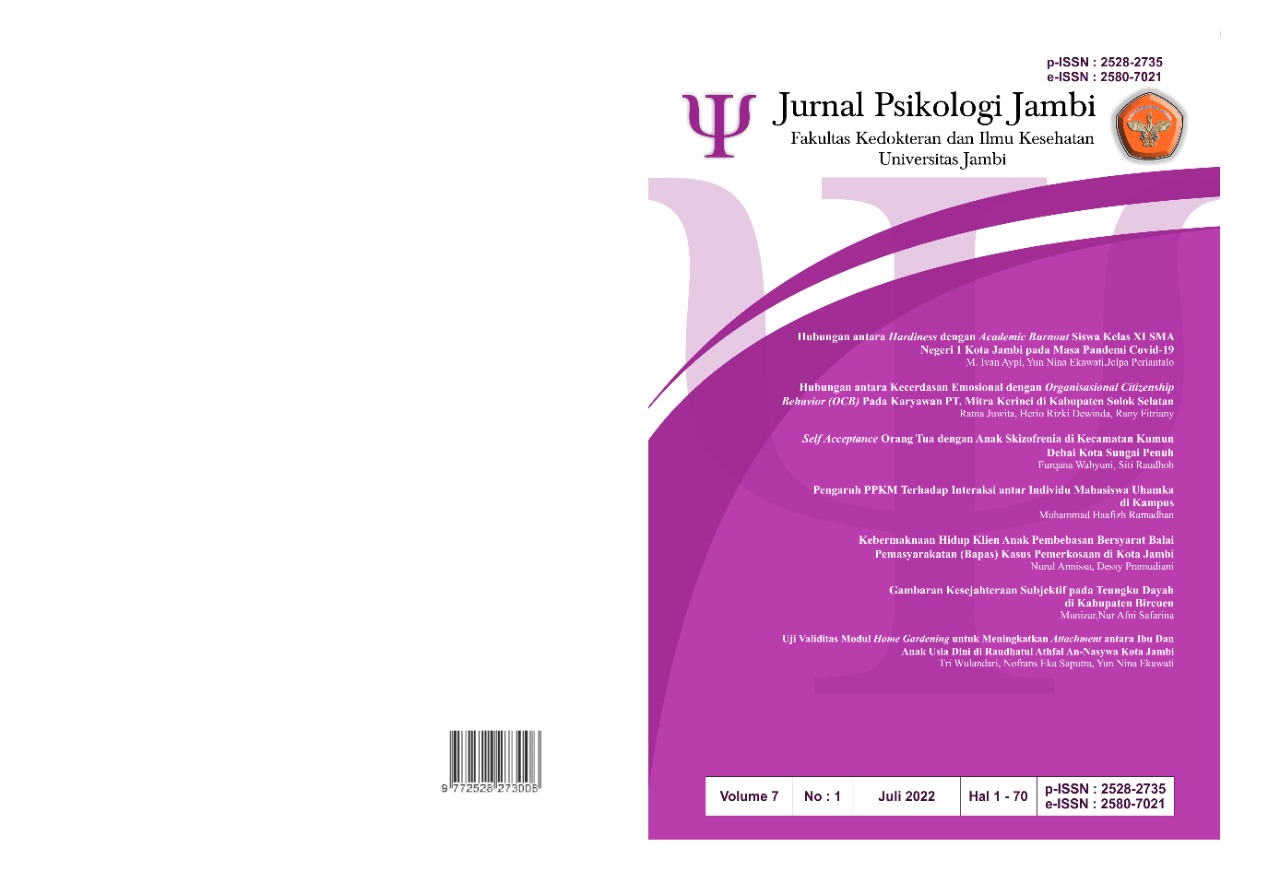GAMBARAN KESEJAHTERAAN SUBJEKTIF PADA TEUNGKU DAYAH DI KABUPATEN BIREUEN
DESCRIPTION OF SUBJECTIVE WELL-BEING OF TEUNGKU DAYAH IN BIREUEN REGENCY
DOI:
https://doi.org/10.22437/jpj.v7i1.20139Abstract
Introduction A life full of satisfaction and happiness is the dream of all people in the world, including those who work as Tengku Dayah. This study aims to look at the subjective well-being of Tengku Dayah in Bireuen Regency.
Method This study uses a phenomenological qualitative approach with observation and interview data collection methods. The informants in this study consisted of eight Tengku Dayah.
Result The results of this study reveal a description of the subjective well-being of Tengku Dayah in Bireuen Regency, the eight respondents have a fairly good subjective well-being. Based on the aspects and factors that appear in subjective well-being, the first is life satisfaction, the second is positive affect and the third is negative affection. Factors that affect subjective well-being in Tengku Dayah include goals, social interactions, religion, optimism, needs fulfilled, gratitude, coping strategies. Each respondent has faith in Allah, becomes a useful human being for others, feels grateful.
Conclusion The subjective well-being that is felt by Tengku Dayah is that the Tengku Dayah feel satisfied and happy with the life they are living now, so with the emergence of feelings of satisfaction and happiness with what Tengku Dayah is doing, the subjective well-being experienced is quite good.
Keywords : Subjective Well-Being, Teungku Dayah
Abstrak
Pendahuluan Kehidupan yang penuh dengan kepuasan dan kebahagiaan merupakan impian manusia hidup di dunia, tidak terkecuali bagi mereka yang berprofesi sebagai Teungku Dayah. Penelitian ini bertujuan untuk melihat gambaran kesejahteraan subjektif pada Teungku Dayah di Kabupaten Bireuen.
Metode Penelitian ini menggunakan metode kualitatif dengan pendekatan fenomenologi, metode pengumpulan data menggunakan observasi dan wawancara. Informan dalam penelitian ini terdiri dari delapan orang Teungku Dayah.
Hasil penelitian ini mengungkapkan gambaran kesejahteraan subjektif pada Teungku Dayah di Kabupaten Bireuen, kedelapan responden memiliki kesejahteraan subjektif yang sudah cukup baik. Berdasarkan aspek dan faktor yang muncul dalam kesejahteraan subjektif diantaranya; pertama, kepuasan hidup. Kedua, afeksi positif. Ketiga, afeksi negatif. Faktor yang mempengaruhi kesejahteraan subjektif pada Teungku Dayah meliputi tujuan hidup, harga diri positif, hubungan positif, optimisme, agama, kebutuhan terpenuhi. Masing-masing responden mempunyai keyakinan terhadap Allah, menjadi manusia yang bermanfaat untuk orang lain, dan merasa bersyukur.
Kesimpulan dan Saran Kesejahteraan subektif yang dirasakan Teungku Dayah bahwa para Teungku Dayah merasa puas dan bahagia dengan kehidupan yang dijalani sekarang, timbulnya perasaan puas dan bahagia yang dijalani Teungku Dayah membuat kesejahteraan subjektif juga cukup baik, dengan penelitian ini diharapkan Teungku Dayah dapat meningkatkan kesejahteraan subjektif.
Kata kunci : Subjective Well-Being, Teungku Dayah
Downloads
References
Almuhajir, A. (2020). Manajemen Teungku Dayah: Pemberdayaan Personalia Lembaga Pendidikan Islam Di Aceh. Journal Analytica Islamica, 7(2), 117-130.
Caplin, James P. (2011). Kamus psikologi. PT Raja Grafindo Persada. Diener, E., Wolsic, B., & Fujita, F (1995). Physical attractiveness and subjective well-being. Journal of personality and social psychology, 69(1), 120.
Diener, E., Suh, E., & Oishi, S. (1997). Recent findings on subjective well-being. Indian journal of clinical psychology, 24,. Diener, E. D., & Suh, M. E. (1997). Subjective well -being and age: An International analysis. Annual review of gerontology and geriatrics, 17 (1), 304-324.
Diener, E., Suh, E. M., Lucas, R. E., & Smith, H. L. (1999). Subjective well-being: Three decades of progress. Psychological bulletin, 125(2), 276. Diener, E. (2000). Subjective well-being: The science of happiness and a proposal for a national index. American psychologist, 55 (1), 34. https://psycnet.apa.org/doi/10.1037/0003066X.55.1.34 Diener, E., Lucas, R. E., & Oishi, S. (2002). Subjective well-being: The science of happiness and life satisfaction. Handbook of positive psychology, 2, 63-73.
Diener Ed., Richard E.L & ShigehiroOishi. (2003). Subjective wellbeing. The Science Happines and Life Satisfaction.
Diener, E., Pavot, W. (2003). Review of statisfaction with life scale. Psychological Assesment. American Psychological Association. 5 (2), 164-172.
Diener, E., & Scollon, C. (2003). Subjective well-being is desirable, but not the summum bonum. article présenté à la conférence University of Minnesota Interdisciplinary Workshop on Well-Being, Minneapolis. http://www.tc.umn.edu/~tiberius/workshop_papers/DIENER.pdf
Diener, Ed. (2007). Culture and wellbeing : The collected works of Ed Diener. Springer is Part of Springer Science + Busines Media.
Diener, E., Biswas-Diener, R. (2008). Happines: unclocking the mysteries of psychological wealth. Blackwell Publishing. Diener, E. (Ed.). (2009). The science of well-being: The collected works of Ed Diener (Vol. 37). Springer Science & Business Media.
Diener, E., Lucas, R. E., & Oishi, S. (2002). Subjective well-being: The science of happiness and life satisfaction. Handbook of positive psychology, 2, 63-73.
Diener, E., Oishi, S., & Lucas, R. E. (2015). National accounts of subjective well-being. American psychologist, 70(3), 234. https://psycnet.apa.org/doi/10.1037/a0038899
Diener, E., & Biswas-Diener, R. (2002). Will money increase subjective well-being?. Social indicators research, 57(2), 119-169.
Firdaus, F. (2019). Peran Organisasi Teungku Dayah Dalam Pelaksanaan Syariat Islam di Aceh (Doctoral dissertation, Universitas Islam negeri Sumatera Utara).
Howell, R. T., & Howell, C. J. (2008). The relation of economic status to subjective well-being in developing countries: a meta-analysis. Psychological bulletin, 134(4), 536. https://psycnet.apa.org/doi/10.1037/0033-2909. 134. 4. 536 Lucas, R. E., Diener, E., & Suh, E. (1996). Discriminant validity of well-being measures. Journal of personality and social psychology, 71(3), 616.
Lucas, R. E., & Baird, B. M. (2004). Extraversion and emotional reactivity. Journal of personality and social psychology, 86(3), 473. https://psycnet.apa.org/doi/10.1037/0022-3514.86.3.473
Jailani, J. (2017). Peran dan Tanggung Jawab Dayah Dalam Membina Akhlak Santri. AT-TA'DIB: Jurnal Ilmiah Prodi Pendidikan Agama Islam, 179-195.
Khavari. (2000). The Art of Happiness. Serambi. Myers, D. G., & Diener, E. (1995). Who is happy?. Psychological science, 6(1), 10-19. https://doi.org/10.1111%2Fj.1467-9280.1995.tb00298.x
Myers, D. G. (2000). The funds, friends, and faith of happy people. American psychologist, 55(1), 56. https://psycnet.apa.org/doi/10.1037/0003-066X.55.1.56
Pavot, W., & Diener, E. (2004). The subjective evaluation of well-being in adulthood: Findings and implications. Ageing International, 29(2), 113-135.
Seligman, M. (2002). Authentic Happiness : Using the new positive psychology to realize your potential for lasting fulfill-ment. Free Press.
Sessiani, L. A. (2018). Studi Fenomenologis tentang Pengalaman Kesepian dan Kesejahteraan Subjektif pada Janda Lanjut Usia. Sawwa: Jurnal Studi Gender, 13(2), 203-236.











